Michaela Bencova continues her tour of the umpires who will be participating in the 2012 London Olympics. This month, she meets with Sven Serré, a 40-year-old umpire from Belgium.
Photos: rights reserved and Badmintonphoto
How long time have you been umpiring?
At the Olympics next year, I will have been umpiring for exactly 20 years. Nice holiday, isn’t it! I started in 1992 after a bad injury. I liked the sport and wanted to stay in contact with it. My club needed an umpire to obtain a licence to organize a tournament. And so it went.
How did you start with badminton?
I started playing badminton myself thanks to a good school friend, when I was 13 years old. He invited me to the club on Wednesday afternoons. I had fun being away from home and doing an active sport.
In countries like China, Malaysia, or England, when we say badminton, people know what it is. How popular or known is badminton in your country?
Badminton is not very well known in Belgium, despite the fact that there are more than 30,000 players. The Belgian Badminton Federation is split up into the Flemmisch League and the Walloon League. The split was made for political and financial reasons. It is not always easy to work that way, but the family of technical officials understand each other very well. We don’t have to wait for more than 500 days as the politicians do to form a government.
If somebody wants to be umpire in your country, what is the procedure?
Interested people announce their interest at the local level. Recruiting is done from the provincial level and that’s where the umpire education starts: first the laws and then on Saturdays, for half days, the first contact with players and their first steps as an umpire.
At the league level, two ‘standardization days’ are organized to put the candidates on the same level. After 8 months during the provincial championships, the final assessment is made. A written exam officially concludes the assessment and training period.
We are talking about professional players, professional coaches, but professional umpires don’t exist because we are not paid for umpiring. We are volunteers. So how is it with finances in your country if you want to travel for tournaments?
The different leagues understand that badminton needs umpires and technical officials and has a broad budget to support them. Every day of umpiring in Belgium is rewarded by €30, give or take. Every international umpire can attend 2 up to 3 tournaments a season abroad, paid for by the federation. Not bad I think in this difficult crisis period.
When not umpiring ‘professionally’, what is your job?
I’m not a professional umpire, but I would like to do it for 2 or 3 years. Why not? In daily life, I’m a officer of the Belgian Armed Forces, responsible for the Public Affairs Office of Belgian Defence.
And your hobbies apart from badminton?
My family. In addition to being an umpire and a professional military officer, I’m also the father of two daughters and have been married for 15 years. Most of my free time goes to them. And for my personal balance, I run an average of 35km a week and I cook meals daily. In the umpire world, I’m also known as the ‘running umpire’. Run, Sven, run!
What is the funniest or the most frustrating moment you’ve experienced on court?
The funniest moment was a shuttle colliding with a bird at the French Open. Unbelievable! There were some birds inside the Carpentras hall in Paris. They collided during a mixed doubles match. Unfortunately, the bird was hurt and crashed onto the court. Play was interrupted.
The most frustrating moment was being stuck at the European Championships due to the Icelandic volcano. I was home two days later than planned.
Recently you were nominated to officiate at the Olympic Games in London 2012. What does it mean for you and your family?
I’m honoured to be part of the Olympics, the biggest sports event in the world. I’m curious to see what it will be like. It’s nice to be compensated after 15 international years of umpiring.
Carpe diem – seize the day. Always believe!
![OFFICIAL’S WHISTLE – Meet Sven Serré, the running umpire Michaela Bencova continues her tour of the umpires who will be participating in the 2012 London Olympics. This month, she meets with Sven Serré, a 40-year-old umpire from Belgium. Photos: […]](https://www.badzine.net/wp-content/uploads/Newsflash-thumbnail.png)
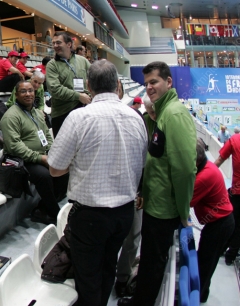
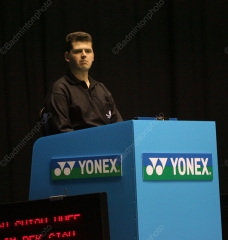
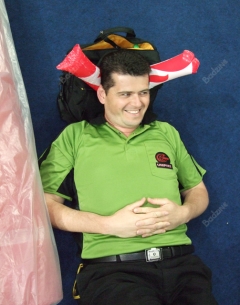

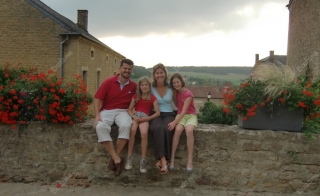
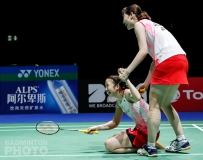
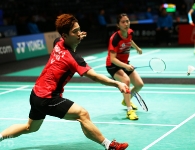
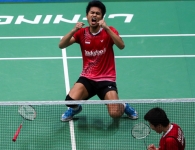



Leave a Reply